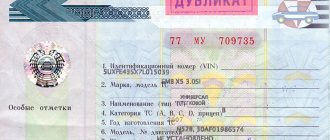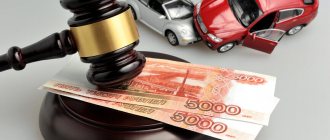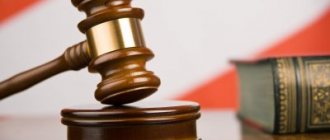Undoubtedly, every car buyer does not want to face the problem of the goods being pledged or seized. Whereas today you can check the legal purity of a car in a few minutes.
Dear readers! Our articles talk about typical ways to resolve legal issues, but each case is unique. If you want to find out how to solve your particular problem, please use the online consultant form on the right or call. It's fast and free!
It is unwise to purchase a car, even in amazing condition, if it is associated with serious legal problems. In this case, the buyer risks not only not receiving the goods, but also losing the money spent for it.
Not only that, in some cases buyers end up in jail for a criminal offense committed by another person (the seller).
Therefore, checking a car for legal purity requires seriousness; neglecting it is fraught with the indicated consequences.
When to check a car when buying?
The car should be checked for legal purity immediately after the first inspection before signing a car purchase and sale agreement. Once the sale transaction has taken place, it will be difficult for the buyer to prove that he is right and there is a high risk of losing money. Usually, legal problems with a car emerge at the stage of paperwork, when the new owner realizes that it will not be possible to register the purchase. There is no way to find the previous owner, and the buyer has already lost the money invested in the car. Then the courts and problems begin.
Attention! If you have any questions, you can chat for free with a lawyer at the bottom of the screen or call Moscow; Saint Petersburg; Free call for all of Russia.
Ideally, you need to invite the seller to be present at the removal and installation of the car for registration with the traffic police, and then pay. Then the buyer will be able to ensure that the transaction is legal and that there are no problems when registering the vehicle.
Types of legal problems
To know how to check a car for legal purity before purchasing, you need to know all the existing legal difficulties.
Here is a small list of problems that arise quite often:
- A crime car is a car involved in an unclosed criminal case. This includes the following crimes: theft using a car, the use of a car as a weapon to commit an act, a road traffic accident (RTA) causing serious consequences, etc.
- The car is on credit or as collateral - the car is collateral in financial transactions with a bank (for consumer or car loans, loans and borrowings, etc.).
- A “constructor” car is a vehicle that has undergone disassembly and assembly operations. Usually this is done by unfortunate businessmen to reduce customs duty rates.
- A car with problematic documentation - these include clone cars (doubles registered with a fake technical passport), illegally crossed the border or uncleared cars, vehicles with a ban on registration or operation, a car with suspicious documents, etc.
The times when problematic cars were everywhere on the used car market have sunk into oblivion. Potential buyers suffered first of all, since checking the desired car before purchasing was almost impossible.
Today, gray schemes and legislative loopholes that are unprofitable for the state and people have been eliminated. For a person who decides to purchase a device second-hand, there are many options for checking a car online using limited data.
It is worth being aware that not a single online service guarantees complete reliability of the data. Fraudsters are also finding more and more ways to deceive others every day, without neglecting advanced technologies.
To ensure greater insurance against falling into the clutches of adventurers, you need to use all available verification methods: listen to the advice of experienced car owners, study criminal schemes, use free and paid Internet resources, check with experts, etc.
Why check your car for legal cleanliness?
If you miss the moment of checking the legal purity of a car when purchasing, you may encounter the following difficulties in purchasing a car:
- Listed as stolen. It does not matter how many times the car was resold. If it is discovered, I will cancel all transactions and return it to the owner from whom it was stolen.
- Participated in a traffic accident resulting in death or serious injury.
- The car appears in a criminal case in which the culprit has not been found.
- It is collateral or is detained by bailiffs under Article 80 of Federal Law No. 229 “Law on Enforcement Proceedings,” in particular the seizure of the debtor’s property.
- Important parts were replaced without being indicated in the documents.
- Fake registration certificate or PTS.
- It is registered in another country where it could have been stolen.
Any of these details of the legal purity of the vehicle suggests the presence of problems during registration and operation of the vehicle. You may have to pay extra to pay off the banks or lose your car altogether.
According to Order No. 1001 of 2008, it is prohibited to drive an unregistered vehicle. Therefore, if a registration ban is imposed on the purchased car, then you will not be able to use the purchase.
Registration certificates or extracts from the house register
Buying an apartment with citizens registered in it is a fear for any purchaser. On the one hand, there are no particular problems in this. Persons who do not want to be discharged voluntarily will be discharged through a judicial procedure. On the other hand, trial is always long and expensive.
To ensure your own safety and peace of mind, it is recommended that before the transaction you obtain from the seller documents confirming the absence of persons registered in the apartment.
It could be:
- certificate in form 9 (about persons registered in the apartment). The document also contains information about those persons who were deregistered at the specified address;
- a certificate in Form 12 reflects information about persons who were deregistered for other reasons. In theory, such citizens can still apply for registration, which can become a serious problem for the new owner;
- extract from the house register. Includes information about persons who were registered at the specified address. Allows you to obtain data about citizens who have the right to reside in the apartment.
It is better to postpone the transaction if the certificate in Form 12 indicates persons deregistered for other reasons. Most often, the basis is a court decision. If it was in absentia and the citizen did not know about it, he will be able to cancel it (provided that he proves that he did not know about it for good reasons). This will create additional difficulties.
The ideal option is to obtain an archival extract from the house register for the apartment. But difficulties may arise here. House and apartment books have been eliminated and are no longer kept. In some regions they continue to operate, but new ones are not issued.
It is sometimes impossible to obtain an extract from such a book, especially an archival one. It all depends on the specifics of regional legislation and established practice. For example, in the Krasnodar Territory and St. Petersburg the document is not issued at all; you will have to be content with forms 9 and 12.
The transaction is completed even if there are registered citizens in the apartment. The law obliges you to indicate them in the text of the contract, but does not oblige you to write them out before going to Rosreestr or the MFC. But it’s worth thinking carefully about this purchase option.
Often the parties indicate in the text of the transaction the obligation of the seller to ensure the deregistration of such citizens. A certain period of time is allotted for this. Rosreestr will register the agreement, but the buyer will have to solve subsequent problems independently.
If all registered persons have reached the age of majority, then they can be discharged through the court. The judge has the right to refuse to satisfy claims when the registrant is a minor. The rights of the child must be taken into account, i.e. it is necessary that he have another place of registration and residence. The guardianship authority is involved in the process, which will increase the time it takes to consider the case.
[to contents









